My buddy Alec and I made a pact after our tutorial to tackle 3-5 competitive scenarios before running through the Cooperative mode of Voidfall. That worked well for me, because my intention was to play Voidfall 14 times—once for each of the game’s factions—before finalizing my review.
The game is that big. And as much as I am enjoying the “bigness” of it all, the reason you will keep coming back to this game, or not, is because of the set up time.
“A labor of love” is not a term I use regularly, but I’m surprised how often I return to this thought when I drop the large Voidfall box (the Galactic Edition, all the bells and whistles) on my table to begin setup. I really thought people were exaggerating this investment after the first few setups; could it really take as much as an hour to set up a game like this?
I’m on my 14th setup of Voidfall (six competitive games, eight solo/co-op games), and I can confirm that Voidfall takes about 45 minutes EVERY TIME I set it up from scratch. Granted, this is mainly because I don’t have a dedicated table that can hold Voidfall throughout the week, or a sunken play area on my game table with a tabletop cover that can be used to hide my games between plays. Clearly, if you have a table that this can live on for a few weeks, Voidfall should just remain out and ready for players to dive into.
I’m really worried about this, because I’m already in touch with friends who think they will give up their copy because the setup is such a bear.
Why is setup so rough? A few elements rise to the top. First and foremost is the map setup in the Compendium for each scenario.
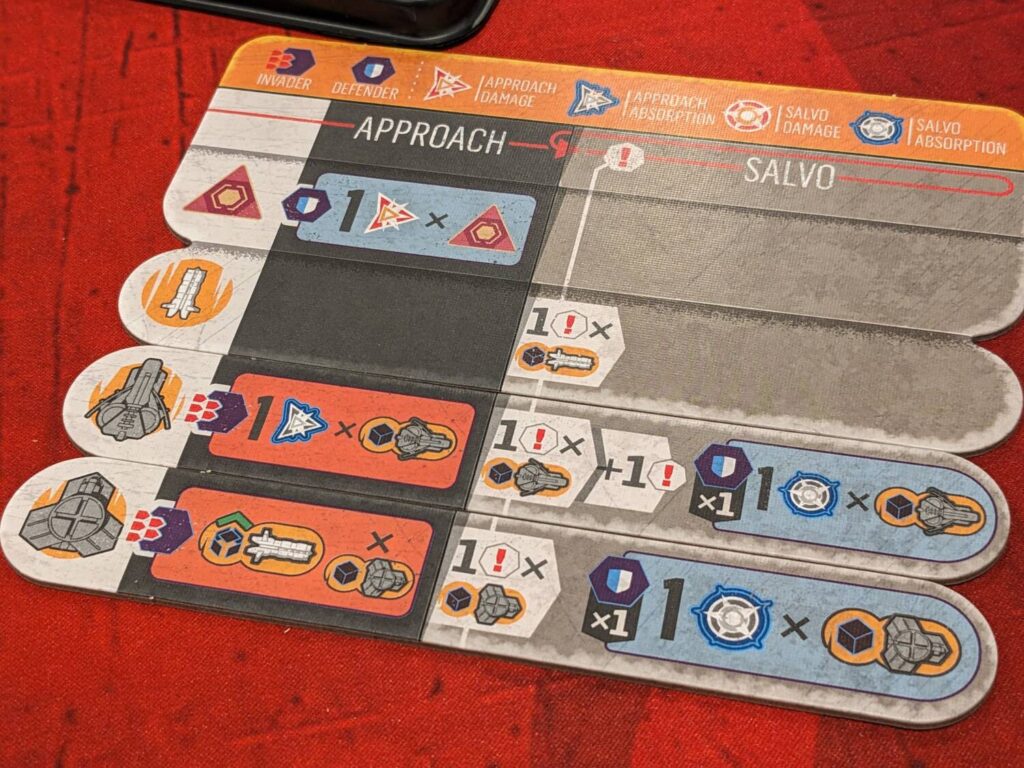
I don’t have any issues with the Compendium, the wire-bound scenario guide that also features the game’s setup requirements. It is excellent, and I have most of the iconography down pat. But you are still laying out 12-15 tiles (I’m only doing two-player scenarios, so my maps are smaller), some of which are different than the standard home and generic sector tiles. You’ve got to lay out ships—and this point is a problem mostly for owners of the Galactic Box, since there are plastic miniatures—Bounty tokens, Reclaim tokens, Population dice, Corruption tokens, Glory tokens, Sector Defense tokens, Harbingers, and Voidstorm tokens that create barriers between certain tiles.
[A special shout-out to my seven-year-old son, who might love Voidfall setup more than anyone in the world. “Daddy, is it Voidfall Night?” he always asks on Tuesday afternoons, knowing that Tuesdays are always Voidfall Night lately. “Can I put the ships on the stands?” I’m not sure if it is illegal or not to have my son employed as a ship builder, but he does great work with plastic miniatures!!]I find that just doing the map takes 15-20 minutes, often longer. Then you’ve got Galactic Event cards to shuffle, technologies to first take from each House faction’s tray then sort in a technology tableau, then work on individual House setup tasks. Thank the stars that a storage solution from Game Trayz is involved, because sorting items out of the box is much easier than if everything was simply bagged.
That House setup does take a little longer than normal because I like to read the back of each House mat to read the designer tips for the faction I’ve just selected along with the flavor text. The artwork from Ian O’Toole doesn’t hurt either. Each House also gets different resources to begin play, and you’ll want to review the tech tableau to understand what’s in play for each session. (There are always eight different techs in the market, and each player gets one technology with their starting faction.)
I sometimes find myself exhausted by the simple act of setup. But then I slowly get fired up to dig into the scenario we are playing, and that frown turns upside down by the time we reveal the first Galactic Event.
Your experience with Voidfall will be much different when you are the owner and setting this up by yourself, versus walking into a room with a fully-set Voidfall table ready to play. I’m actually excited by the idea of going to a friend’s house to play Voidfall when they’ve done all the setup legwork, and I just have to pick a House to play.
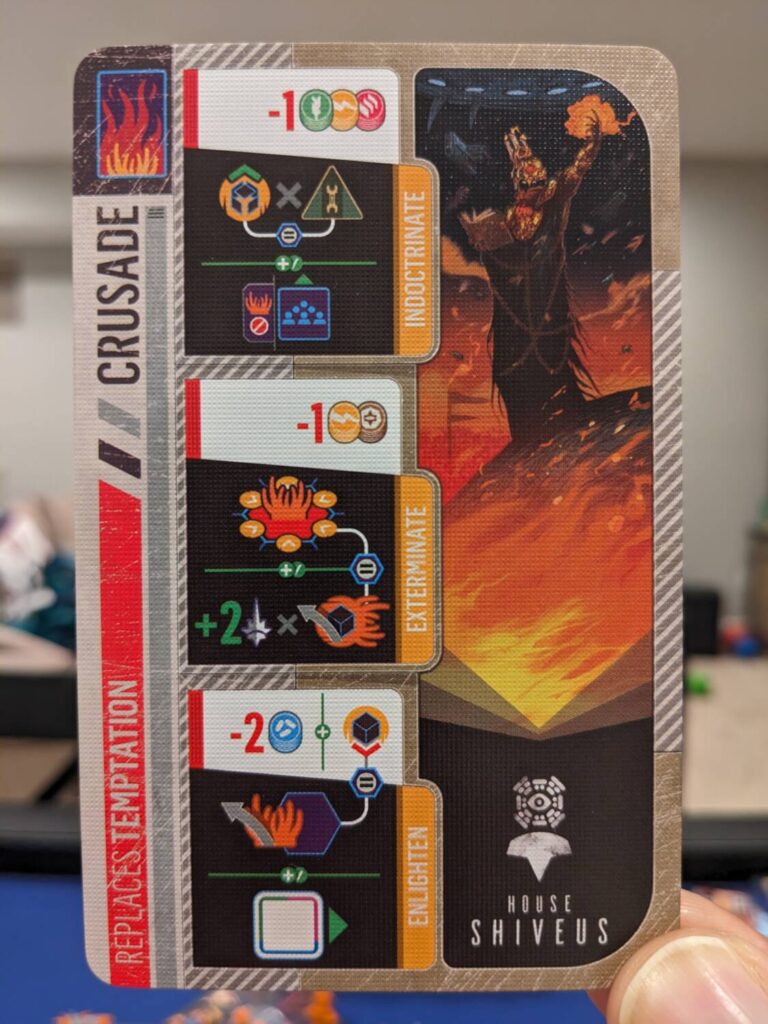
“Grunt Grunt It’s Your Turn Grunt Grunt Grunt”
As I noted in the tutorial overview, Voidfall has a billion rules. It has so many rules that I am still referencing the rulebook for edge cases 14 plays into my Voidfall experience.
If you want to learn how to play Voidfall, I invite you to watch the 63-minute rules video or read the PDFs of the game’s three massive rulebooks, but I won’t be covering the rules in detail here.
At its core, Voidfall is an exceptionally well-designed hand management efficiency game that features agonizing choices over a series of about 15 turns per player. (I could write an entire article about the fascinating design choice behind the game’s variable number of turns per round. I’ll summarize this choice: it’s cool.)
Voidfall is, for the most part, a game you will play by yourself with others at the table, or by yourself with no one else at the table. This really came to light during my second or third competitive play with Alec, when we found ourselves mostly “playing a game together” by staring deeply into the eyes of our nine Focus cards, trying to determine the most efficient way to take a turn and score Influence points.
“OK, I’ve got Shields, so I know I can go over there, have a 4-3 Initiative advantage, take one guy out then the Voidborn takes one of my Fleet Power out—” I said out loud, to no one, and myself.
“…[sounds sounds sounds] and that gave me eight points. Your turn, Justin. If I play Conquest over here, [sounds sounds sounds]” Alec said, I think to me, but likely to himself.
Play like this continued for two hours.
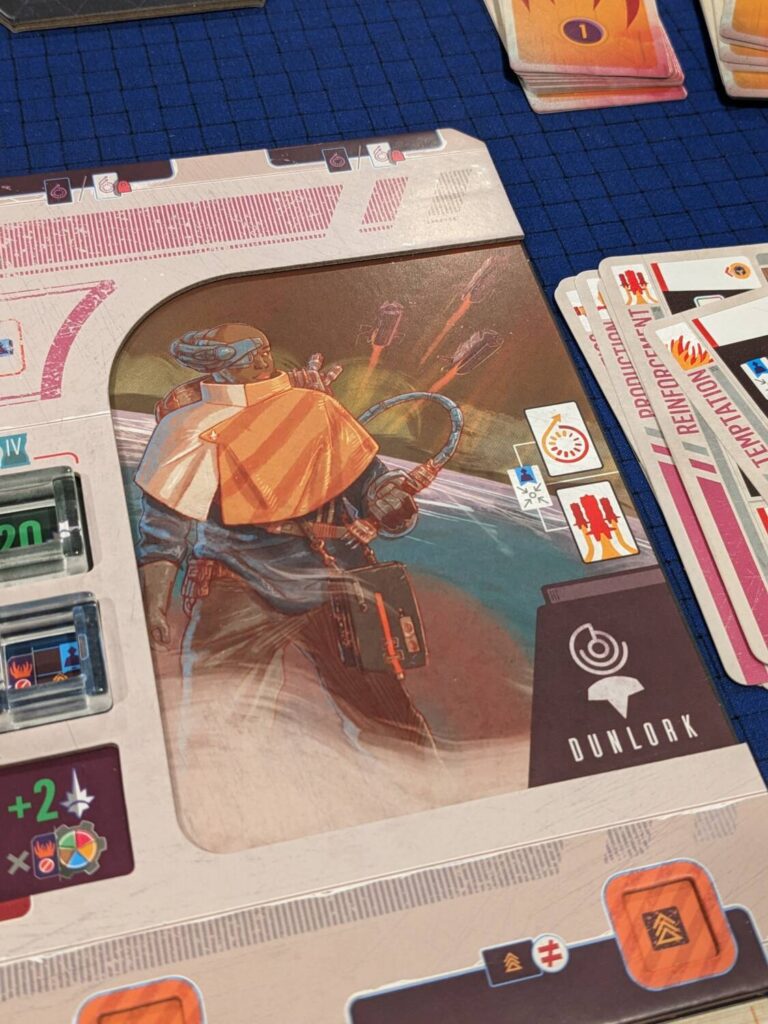
The term “multiplayer solitaire” is a term levied against Voidfall and other games like it. I get it. Many people like to sit down at the table, and “play a game together” by sitting together but mostly playing their own game on their own player board. While I generally don’t like experiences like this, I do like them when the player count is low and the design provides me with chances to really optimize the best way to attack a puzzle.
That’s the main reason why I am enjoying competitive mode. The choices here are brilliant. The maps are designed to challenge the best way to optimize the mix of individual House powers (Voidfall is not asymmetrical by any means, so “variable player powers” feels more appropriate).
Each scenario’s map setup, the Focus cards (particularly when a House has 1-2 special Focus cards that replace the standard ones) and that scenario’s technologies all make the puzzle challenging, and quite different each time. Forcing all of this into scoring Agenda cards in the best way possible is an incredible challenge.
The multiplayer solitaire stuff is what I keep thinking about when considering Voidfall as a “4X” game. Even the back of the Voidfall box describes Voidfall as a 4X game. I respectfully disagree with this categorization. Many of the game’s maps go so far from being able to interact with other players that during our first competitive scenario, Kingdom Come, Alec and I knew we were too far apart to do anything meaningful to disrupt the other person, so we just kept to ourselves.
After we tried Kingdom Come, we moved to Second Genesis, a scenario with a max Aggression rating. By the end of the first Cycle, I assumed we were on a path to at least having a shot at combat between the two of us. Then the next Cycle’s Galactic Event punched us in the face: we had to remove two Guilds from a Pure sector, demolishing our respective production engines.
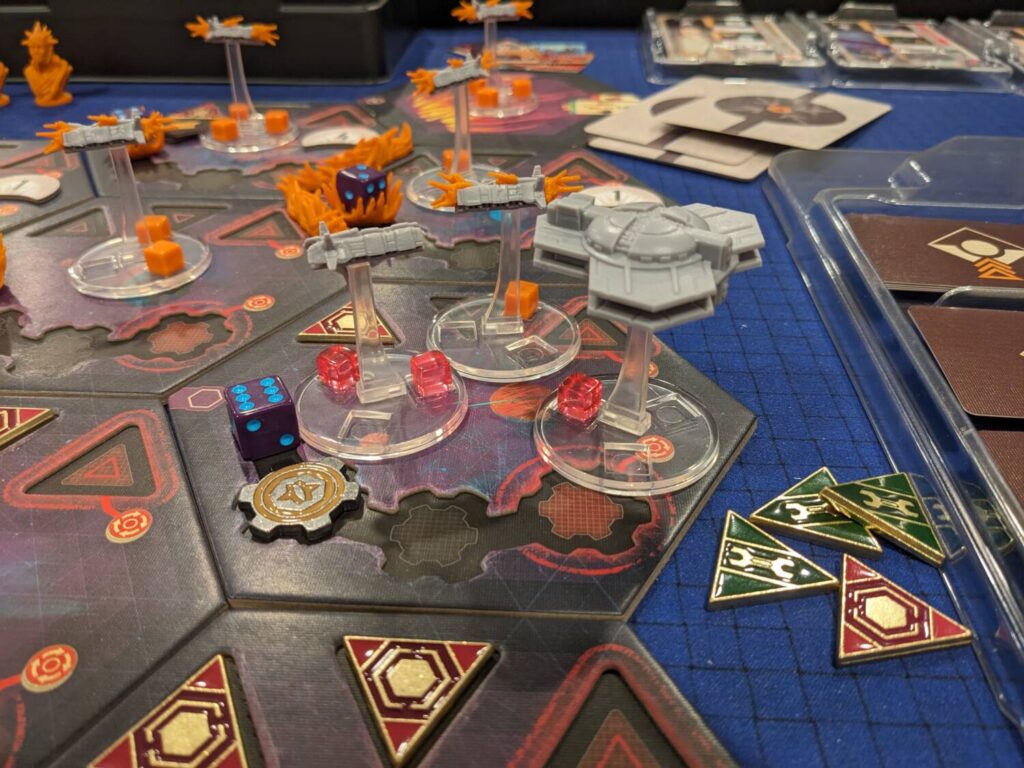
That means that even on maps where you have a better chance at considering head-to-head combat strategy, Galactic Events still might change the rules for a round. Voidfall’s eXtermination elements (added in with eXpansion, eXploration, and eXploitation in the 4X family) are mostly against an AI that is more roadblock than sharp-edged combatant. Also: the Voidborn never sense weakness and stop by to attack during a Cycle. They only appear at the end of a Cycle, usually in a way that is easy to deflect with even average planning.
My sense is that the designers really wanted to lean away from 4X games like Eclipse: Second Dawn for the Galaxy or other games where players might essentially be eliminated from play via random attacks by AI-driven enemies.
Still, I think I prefer the maps that at least give players a chance at attacking each other. Otherwise, it feels like the only race is on the technology board, and even then, at two players, that mainly comes down to getting the advanced version of a specific tech, since there are enough copies of each basic tech for both players, and the only difference is a four-point bonus. In a game where scores regularly top 200 points, I’m not sure four points is worth skipping a tech that plays into your strategy.
The competitive mode is heads-down. It’s so heads-down that in one of our games, Alec and I were mostly using each other to make sure we had minor rules down pat, and we only talked at the end of each Cycle to report our current scores. Despite this, Voidfall is such an incredible design that I’m willing to move past the fact that I’m not doing much talking with others at the table…as long as there’s basically no one else at said table.
However, we are playing a game and we are keeping score…and when one player has 60 more points than the other at the end of the second round of a three-round game, with no way to disrupt an opponent, there’s a minor problem here that we need to address.
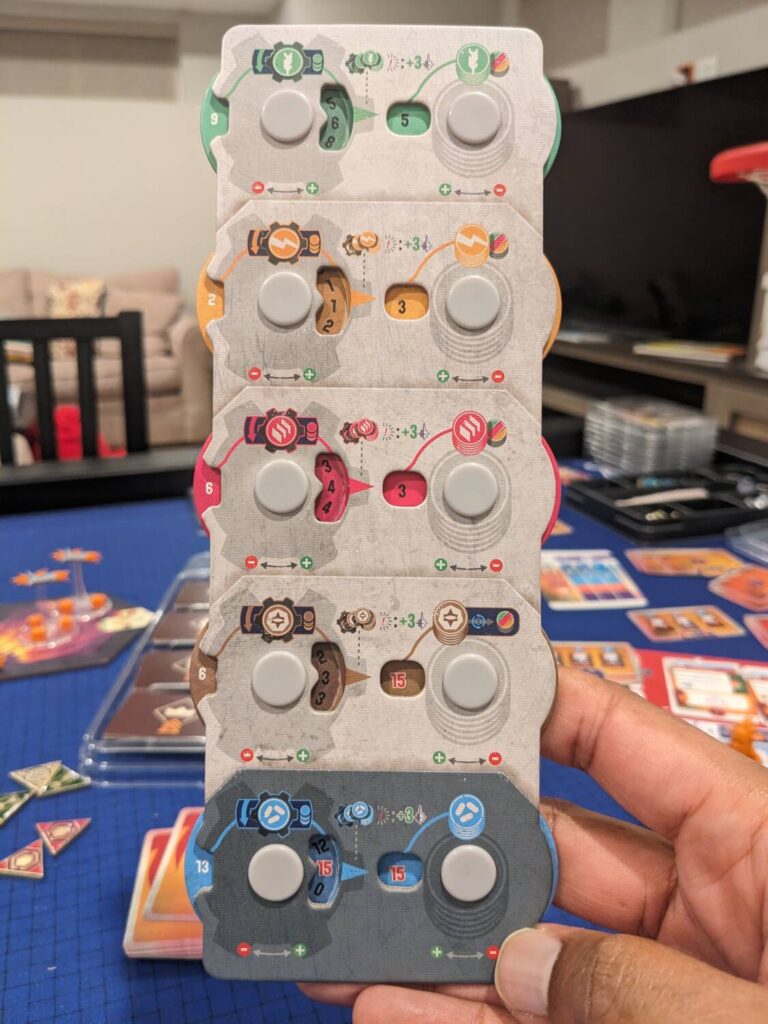
The Runaway Leader Problem
Scores in our competitive games of Voidfall have been all over the map (as low as 172, as high as 283), due in large part to the learning curve and the turns-per-round variability. But sometimes, games are over at the two-thirds point, and that might be discouraging to some players.
That’s because the lack of interaction means that you might look up and realize that you are not in the same zip code, score-wise, as an opponent. (Actually, that description isn’t quite right, because there is no public scoreboard in Voidfall. Players have to announce their score at the end of each round, known as Cycles, because the person farthest behind gets to pick their spot in the upcoming Cycle’s turn order. Side note: we find that going last is usually better than going first.)
I could see some Voidfall contests turning into a discussion about whether it makes sense to concede the game or not, particularly at the highest player counts. Some people shut down when winning is off the table, and I get that. Even if it is fun to continue attacking the puzzle, that’s another 60-90 minutes of watching your buddy Stu score another 150 points while laughing all the way to the bank.
In our two-player games, I haven’t minded that as much, in part because it really doesn’t feel like I’m playing “against” Alec. I’m taking my fifteen-or-so actions, then looking up at the game state and enjoying the results. It also helps that in our games, I’m taking a turn, or planning my next one, with only a few minutes between each turn. I can get down with that, even in a final round where I know I don’t have to worry about something as silly as, you know, winning.
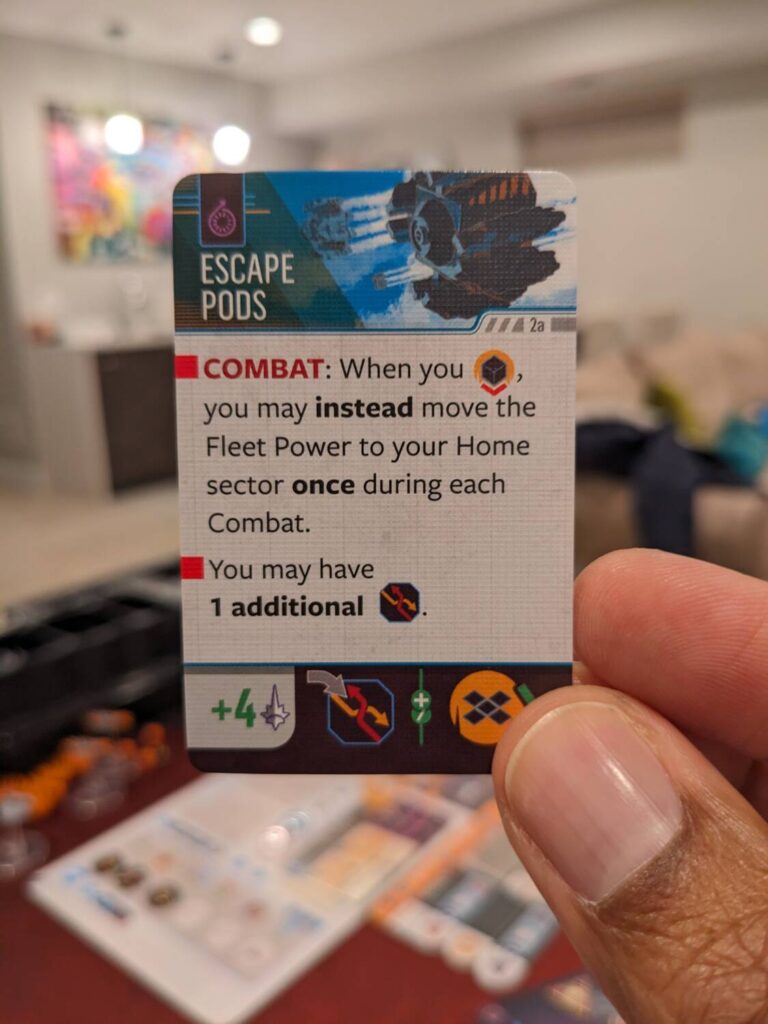
Come for the Focus Cards, Stay for the Technologies
The best part of Voidfall is staring at those Focus cards, and trying to figure out which 4-6 cards I’m going to play in a round based on the revealed Galactic Event. Hegemony’s hand management is the best hand-management mechanism I’ve played this year, because the cards are multi-use. I could take this juicy written-on-the-card action, or burn it for one of these other great actions! What do I do??
The three actions on each Focus card in Voidfall are almost all great, based on the situation and your current resource stockpile to pay for those actions. You only get to play two of the three actions unless you have a Trade token to spend to take every action on a Focus card.
Tough choices abound. In the first Cycle, you will have eight of your nine Focus cards in hand. (Innovation is in your discard pile for the first round.) That means you’ve got 24 different actions you could take on turn number one. Luckily, most first rounds end up being relatively straightforward. You will need to up your production in certain areas, so dropping Guild tokens on your starting home and sector tiles will be at least one of your actions, using the Development Focus card. The Production and Reinforcement cards also get a lot of first-Cycle play in my experience.
The fun really kicks in during the second Cycle. You have all nine Focus cards in hand. Let’s say the revealed event says you have five turns in this Cycle; what cards are you going to play? More agonizing: which cards can you actually afford to play? Even more agonizing: when the second Cycle has only four actions instead of five. Suddenly, the term “action economy” forces a player to really sweat the possibilities.
Only a couple cards let you invade other sectors; in a round where you need more territory, can you take advantage of using all three actions on a Focus card? The Focus cards also trigger which Agenda cards—i.e., the scoring cards—can be played into your tableau, to score end-of-Cycle bonuses.
So, playing Focus cards is the highlight of Voidfall. But staring at the technology board is a pretty close second.
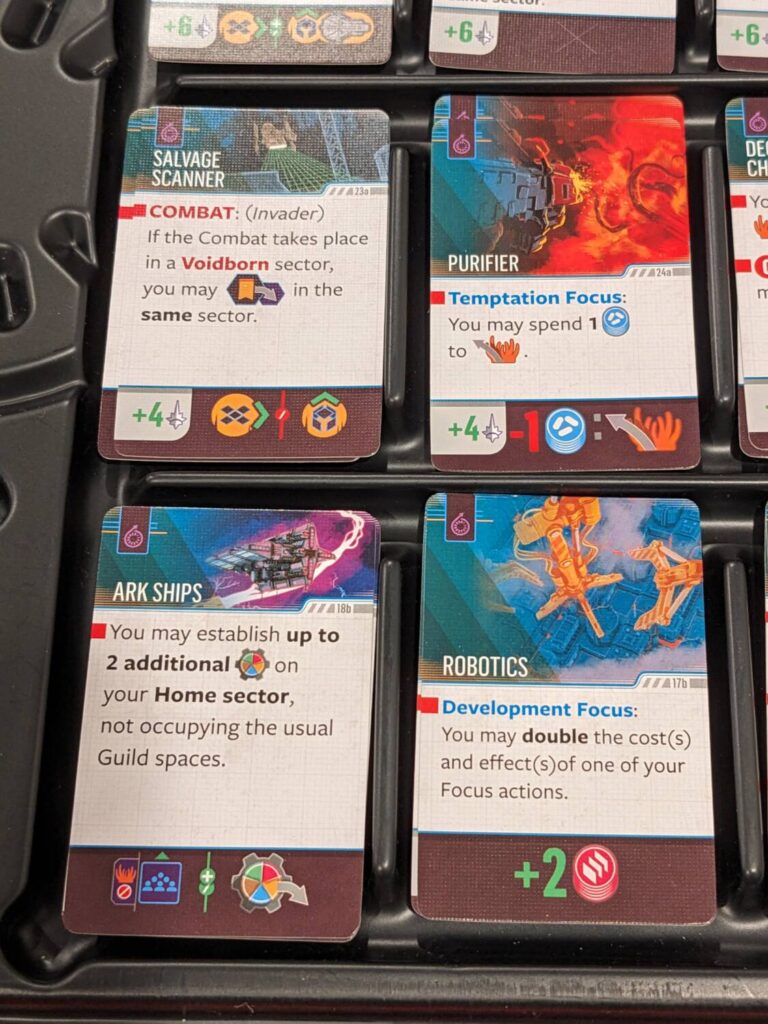
Each game of Voidfall features eight technologies. Alec and I always make a beeline to grab a tech or two during Cycle one, and all of the techs are great. (Of the 28 techs, only one strikes us as almost completely off the table: Central Surveillance. The main power behind this tech requires players to lower their population in a Pure sector to gain bonuses, but lowering a population is typically a bad idea since that reduces production. It’s the only tech I look past when staring at the tableau.)
The combat techs are all great, but based on the House you are managing, you might only need one or two combat techs to shine. Technologies also dictate which upgraded ships are in the game. I absolutely love Destroyers. Shields are great, but the advanced technology version of Shields is essential for late-game Voidborn domination thanks to its absorption of sector defense fire.
Sentries are great too, particular as the ships I want to leave behind when I want to continue exploring adjacent tiles. The tech behind Escape Pods is brilliant—sometimes, I use it to intentionally murder off a fleet token so that it returns intact, on the map, at my home location, especially when I have Agenda cards that score for Fleet Power on each Pure sector.
Combat Replicators? Yes! The fact that I can invade a sector with Sector Defenses and then keep those for myself? And don’t even get me started on the magic of launching firepower with my Shipyards using Deep Space Missiles.
And it is possible that I might be enjoying non-combat techs more than the combat techs!
Trade Nexus gives you the ability to trigger the Trade token bonus both when you take the Trade token and when you return it. Decontamination Chambers is becoming almost an automatic, particularly when paired with the desire to regularly use the Temptation Focus card to stash Corruption off your player board. (Purifier is an intriguing option that stacks nicely if both Decontamination Chambers and Purifier are available.)
The techs are great…and there are 28 of them, creating almost limitless possibilities. I’d actually be fine with only a handful of House factions, but still having all of the 28 tech options. The tech is so good!
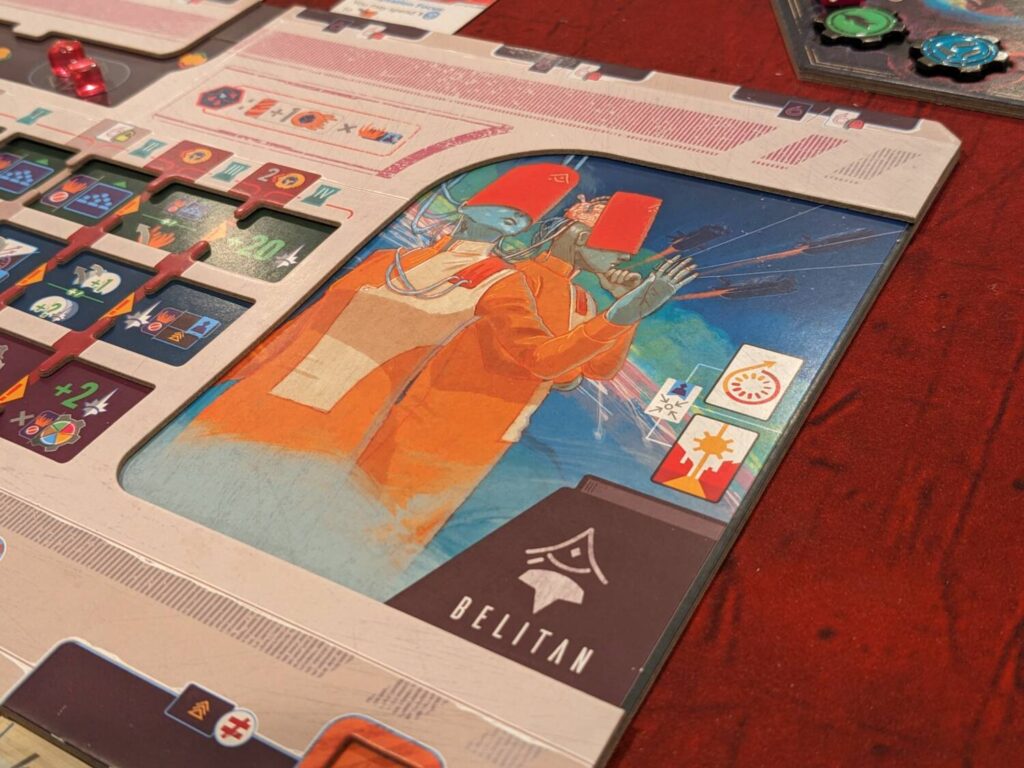
Scoring Stuff is a Blast
Agenda cards are the main scoring component. At the end of each Cycle, you’ll score up to four Agenda cards based on each card’s requirements. Synergizing your Agenda cards in Voidfall is such a fun puzzle.
Each House has a starting Agenda card aligned with its starting technology. The best scores I have seen—both Alec’s scores as well as my own—have come when we have been able to chain the starting agenda with conditions found on other Agenda cards that can be drafted from an open Agenda card market. Plus, if you don’t like the face-up Agenda option in a given row, you can always top-deck two cards to choose one and bury the other.
Let’s say I’ve got a condition that awards points for each of my Shipyards. If I see another face-up Agenda card in the market that also awards points for Shipyards, but also something else that aligns with technology-driven behavior, I’m gonna snatch that from the tableau.
I have also found that I try more and more to get at least one Agenda card in the first Cycle, and at least one—ideally two!—in the second Cycle. That way, I can get a chance at scoring all four Agenda cards, my starting one and those extra three, twice during the game. If I have leaned into all of them in the right way, that’s the path to a 250+ point game. If the stars align and I can maximize the rewards from my Civilization tracks and the third Cycle objective, I might get close to 300 points.
Additionally, I love that Voidfall’s end-of-Cycle rewards and Agenda cards have no limits to the amount of points things can score. You know how some games drop the whole “two points for each wood resource, maximum of 12 points” business on you? Not here. Voidfall wants you to score some points, man. Like, LOTS of points. But because you can’t score for just anything, it is the opposite of a point salad.
I generally don’t like point salads, games where you get a point for taking your turn, or a point for every three leftover coins, or a point when you take an action that no one else took last turn. I want my game to give me 30 points when I lean into the game’s scoring scenario for a specific round. I want 21 points when I meet every condition on my House faction’s starting Agenda. I want to know exactly how many points I’m going to get for invading the Voidborn sector next to my home tile…and I want that number to be high.
I think the scoring mechanics in Voidfall are maybe the most underappreciated parts of its design. I love games like Evacuation in its Race Mode, where it’s the first person to trigger an end-game condition. But if it’s going to have points, I prefer it to look like Voidfall.
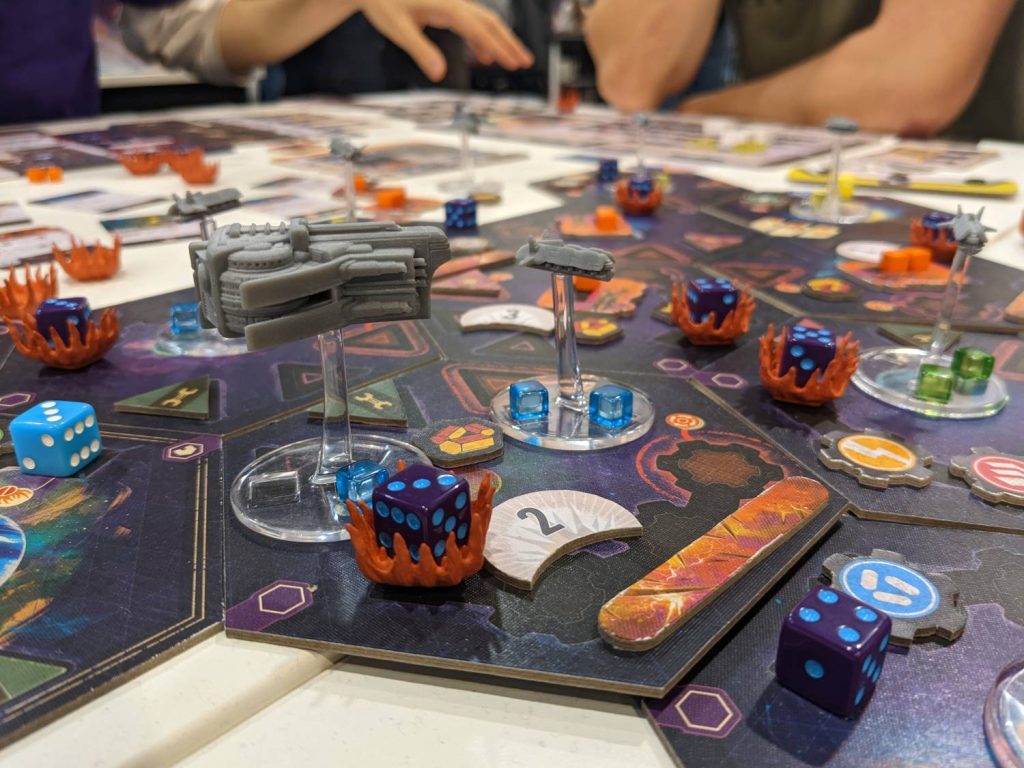
Competitive Mode is a Winner
Here’s how much I love Voidfall’s Competitive Mode: I generally hate games with zero interaction, and I almost never intentionally play two player games with anyone besides my wife. But I would play Voidfall at two players any time.
The scenario designs in the Compendium are great. Like the tutorial, there’s way too much here for Competitive mode. If Voidfall had a third of the setups, but all of the existing Houses and techs, that would be more than most people see in a year. But the “kitchen sink” approach means that you’d have to play Voidfall dozens, likely hundreds, of times to try every individual map with each House.
There are just too many other games to play to imagine a scenario where I play Voidfall 50 times. But after nearly 15 plays (six in Competitive mode), I know I made the right choice to buy this game.


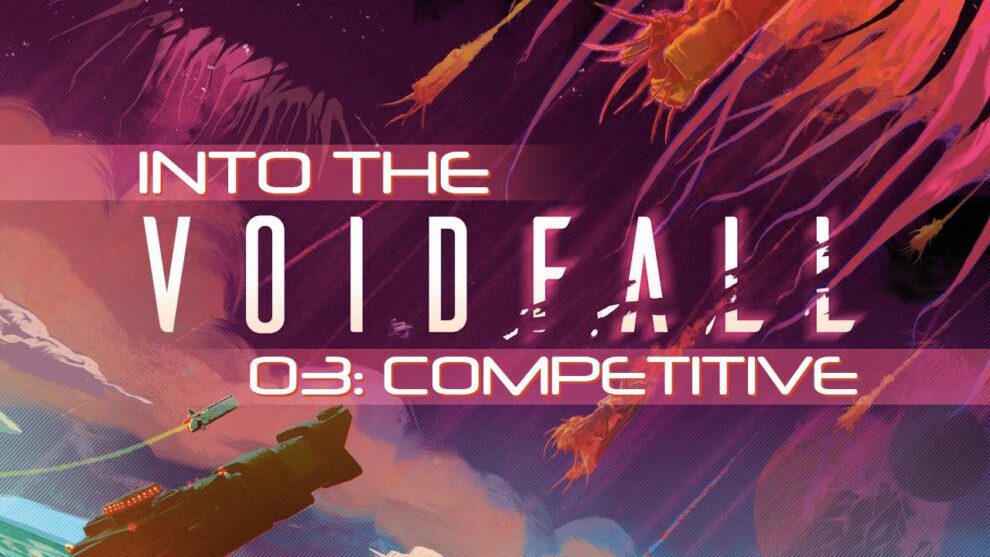


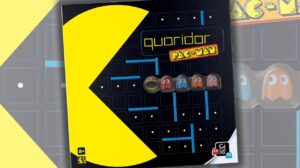






Mr. Bell — I am *loving* this series. Your excitement and love of this game just drips off my monitor. It makes me happy to rad about how happy you are with this game.
That said, despite your love of all things Voidfall, it is obvious from the three articles so far that this is not a game for me and mine. Although I could see myself playing this solo, I fear that with my group this might hit the table once a year; and with that level of play, it would be like learning a new (*huge*) game every time. I guess what I am trying to say is that you are writing a wonderful series that I will continue to read, and that series has allowed me to make an informed decision with which I am comfortable.
Thanks as always.